#BSE Chairman S Ravi
Text
Sethurathnam Ravi, Former BSE Chairman Sees It As a Progressive Journey - GST Collections Gains Momentum in the Past Few Years
From July 1, 2017, a uniform tax on goods and services - marketed by Prime Minister Narendra Modi as "One Nation, One Tax, One Market" - replaced a bewildering array of local sales and entry levies. After years of pulling in 1 trillion rupees ($13 billion) a month or less, GST collections nowadays are consistently 50% higher. The technology has stabilized. Uniform taxation across the country has gone a long way toward making India a common market, logistics and e-commerce have benefited and apart from checking evasion, real-time data on supply chains promises to help small firms access cheap financing.
According to the former BSE Chairman, Sethurathanam Ravi there were some obstacles on the road of GST until its successful acceptance. He says that the way was not easy for GST to get accepted by the people, but surely it was progressive and has finally seen the outcome. After a sluggish start and underwhelming tax collections, GST collections in the past two years have seen a strong pick up. The average monthly collections have risen from Rs 90,000–100,000 crore in the first four years to Rs 1.20 lakh crore now. GST for May, collected last month, jumped an impressive 56% from a year earlier to 1.45 trillion rupees.
Sethurathnam Ravi also says that the Goods and Services Tax has been a major reform across India. It has changed the view of the people about taxes and even the superseding of many of the other small indirect taxes was itself a major reform. GST was one of the toughest reforms to be undertaken in the country, where states gave up their tax sovereignty in the larger interest of the country and taxpayers. GST has in a way helped better administration of taxes, increased speed in the flow of goods across state borders as well as achieved greater uniformity in rates across all states.
GST has also led to the creation of a whole new digital system for paying taxes, claiming input tax credits, generating invoices, e-ways bills, etc. The digital system, even with its many flaws, has helped administration of taxes and tracking tax evasion. The financial expert, S Ravi thinks that the more important factor is how we address to the lower category of people, i.e., the MSMEs and the SME's who have to bring in more awareness and to make the cost of compliance lesser.

According to Mr. Sethurathnam Ravi, over the last 5 years, 47 meetings with the GST council had taken place and every meeting was progressive to address some of these issues. Presently the GST council demands the compensation (for the loss in revenue due to implementation of GST) that the Centre gives to states (initially for the first five years) to extend for another three to five years, a demand the Centre has not been too keen to yield to. The success (or failure) of GST now depends on the smooth resolution of these issues. The GST Council meeting on June 28–29 could give a glimpse of what lies ahead for GST.
0 notes
Text
In Sethurathnam Ravi’s Opinion, Compounded with this Issue was the Platform Issue.
Sethurathnam Ravi (S Ravi) is the former BSE Chairman and founder of Ravi Rajan & Co. Presently, Mr. Ravi holds the position of Non-Executive Chairman of Tourism Finance Corp. of India Ltd. and Director & Managing Partner at RRCA & Associates. Sethurathnam Ravi shares his views about the journey of GST in India as it completes five years since introduction.

According to Sethurathnam Ravi BSE, when the GST was introduced 5 years ago there were a lot of misgivings about how the centre and state governments will work together regarding the tax collection and how the distribution will work. In Sethurathnam Ravi’s opinion, compounded with this issue was the platform issue. At the time of the introduction of the GST, there was also the interpretation and the awareness issue from the SSE and it had also created a lot of confusion in that, he says.
Sethurathnam Ravi also explains the other obstacles that were on the road of GST until its successful acceptance. He says that the way was not easy for GST to get accepted by the people, but surely it was progressive and has finally seen the outcome. In his own words, “There were also issues of input credit, whether it is to be set up against liabilities. Then there were clarifications on that also, and there where issues on various rates that where there. So, I think over this last 5 years, 47 meetings with the GST council had taken place and every meeting was progressive to address some of these issues”.
Sethurathnam Ravi also says that the Goods and Services Tax has been a major reform across India. It has changed the view of the people about taxes and even the superseding of many of the other small indirect taxes was itself a major reform. In this way people had to only pay one direct tax, other than paying many small different taxes. Sethurathnam Ravi also highlights the fact that, to streamline this, in the last few years we have seen, despite a strong covid outburst, a very strong recovery in terms of collection in the form of GST.
“I look at it that it has been a very progressive journey. It was full of challenges of acceptability. But now it has been accepted. And I think more important is how we address to the lower category of people, i.e., the MSME and the SME's who have to bring in more awareness and to make the cost of compliance lesser. And also, to see how the compensation sees is taken care in the future. These are few of the things that will come in the future. But it has been a good journey. And the rationalization is taken place at a very fast pace”, Sethurathnam Ravi concluded.
#Sethurathnam Ravi#Sethurathnam Ravi BSE#Sethurathnam Ravi Former Chairman#Sethurathnam Ravi BSE Chairman#S Ravi BSE#Sethurathnam Ravi Chairman
0 notes
Text
Sethurathnam Ravi, Former BSE Chairman - “CA’s Role Has Diversified Contributing To Nation Building”
Sethurathnam Ravi, popularly known as S Ravi is the former chairman of Bombay Stock Exchange Limited (BSE). On the 74th National CA Day, in an interview with BW Businessworld, Sethurathnam Ravi, currently Managing Partner, Ravi Rajan & Company and Chairman, TFCI reflects on how the role of chartered accountants has evolved over time both in practice and scope, becoming critical to a company’s, a sector’s and the economy’s growth story.
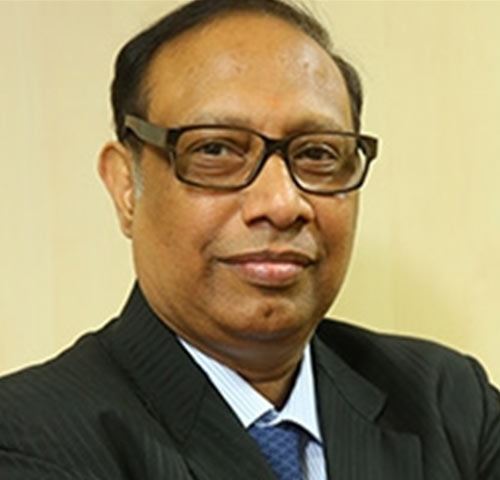
The former BSE chairman explains how he has seen a CA’s role broaden over the years. According to him, “If you look at the earlier years the profession was about statutory audit and internal audit but later it migrated to other fields such as forensic audit, due diligence, merchant banking and also things like insolvency in recent reforms. The profession widened significantly from practice and participation in bigger changes. Today, we see many CFOs, CHROs, CTOs who started as CAs. There are many CAs in the banking sector as well. If you were to compare it with two decades ago, the role has completely changed”. He says that it has become much more diversified, and the ecosystem has changed given the various reforms due to which both the practice and scope are impacted.
Sethurathnam Ravi also shared his observation on the ICAI partnering on nation-building. In his view, the ICAI has played a very vital role. “We got independence in1947 and the institute was formed in 1949. You can see how the system recognized the importance of CAs at the time and they have been part of the nation-building process because CAs audit companies and are part of the growth story but we are also the conscious keepers and watchdogs to a great extent”, he says. He also explains that the CAs help in small-scale industries in imparting knowledge and explaining things such as budgetary, statutory and economic changes where otherwise the domain knowledge is limited. CAs help across this spectrum, contributing toward nation-building.
Sethurathnam Ravi also highlights some points on what more can be done to develop the next generation of accountancy professionals. In his opinion, this is a very important area of focus. “Passing a CA exam itself is tough but the training process should be intensified so they are ready for the changes taking place in the environment. So, more practical orientation is equally important though the institute has taken various steps of imparting practical knowledge even after people qualify the intensity of real-life problems to have to be increased”.
The 21st World Congress of Accountants 2022 will be hosted in India for the first time. According to Sethurathnam Ravi, this is the opportunity to showcase the accounting profession, which is globally well recognised. “It is time to show what Indian accountants can do, their depth and knowledge. Also, it will be in exchange for experience with all the leading countries and their accounting practices”, he concluded.
#Sethurathnam Ravi#S Ravi#s ravi bse#Sethurathnam ravi BSE Former Chairman#Sethurathnam ravi Former BSE Chairman#sethurathnamravi#sravi#sravibse#sethurathnamravibseformerchairman#sethurathnamraviformerbsechairman
0 notes
Text
In Conversation with S Ravi, Former Chairman of BSE: Understanding the Dynamics of Taxation
In a recent dialogue with Tarun Nangia and industry experts, S Ravi, former Chairman of BSE, delved into the discussion surrounding the proposed increase in the GST arrest threshold from 2 crore to 3 crore. Shedding light on the implications for taxpayers, Ravi emphasized the industry’s persistent demand for a higher threshold owing to concerns over potential arrests and pressures on the finance ministry to address the issue.
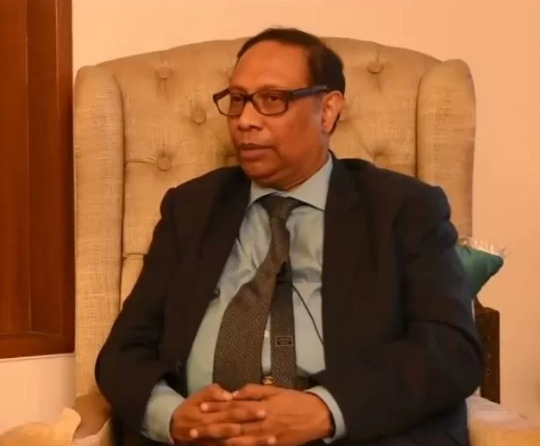
While the proposed increase appears modest, Sethurathnam Ravi noted that industry stakeholders are advocating for more significant adjustments. However, he acknowledged the government’s dilemma regarding the balance between supporting honest taxpayers and combatting fraudulent tax practices, which have been a significant concern given their widespread prevalence.
According to Ravi, the calibrated approach to raising the threshold reflects the government’s cautious stance, particularly in light of the challenges posed by fraudulent tax invoicing. With the introduction of E-invoicing, the government seeks to streamline tax administration while minimizing opportunities for malpractice.
Discussing the broader taxation landscape, Ravi emphasized the importance of striking a balance to prevent undue panic or hysteria among taxpayers. He highlighted systemic issues within the taxation framework and underscored the need for transparent and consultative approaches to tax enforcement.
S Ravi BSE, Former Chairman proposed various techniques, including faceless engagements and consultation with taxpayers before issuing notices, as effective means to address interpretation difficulties and ensure fairness in tax administration. By fostering open dialogue and understanding stakeholders’ perspectives, Ravi advocates for informed decision-making and resolution of taxation challenges.
In conclusion, Ravi’s insights underscore the complexities inherent in tax policy and enforcement. As stakeholders navigate evolving tax regulations, fostering collaboration and transparency remains essential to uphold the integrity and fairness of the taxation system. Through proactive engagement and strategic reforms, policymakers can work towards a more equitable and efficient tax regime that serves the interests of all stakeholders.
0 notes
Text
Fair Taxation Practices: S Ravi's Vision for a Balanced System
S Ravi BSE, the former Chairman, recently engaged in a compelling discussion with Tarun Nangia and other industry experts, shedding light on the proposal to raise the GST arrest threshold from 2 crore to 3 crore and its potential ramifications for taxpayers. Ravi highlighted the industry’s persistent demand for this adjustment, citing widespread apprehension regarding potential arrests, which prompted the issue to be escalated to the finance ministry. While the proposed increase from 2 to 3 crore is considered modest, Ravi emphasized the industry’s desire for more substantial adjustments.
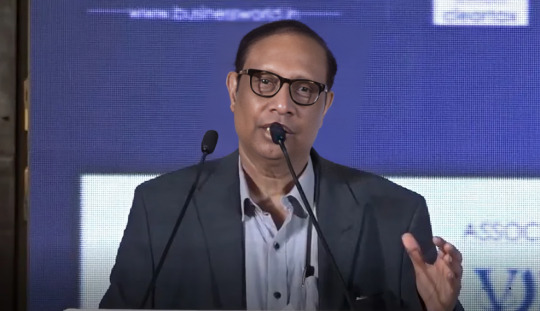
Expressing his insights, Sethurathnam Ravi delineated the government’s delicate balance between supporting law-abiding taxpayers and combating fraudulent tax practices, which have reached alarming proportions. He acknowledged the significant concerns surrounding fraudulent tax invoicing and the formidable challenge of maintaining a fair tax regime. Ravi underscored the calibrated nature of the proposed rise, noting the government’s cautious approach and the introduction of E-invoicing to enhance tax transparency.
Ravi underscored the importance of taxation while emphasizing the need to mitigate hysteria and panic among taxpayers. He advocated for systemic improvements in tax administration, advocating for fair and transparent practices that prioritize dialogue and consultation over arbitrary enforcement measures. S Ravi BSE, the former Chairman proposed a shift towards faceless engagement with taxpayers, fostering mutual understanding and collaboration to resolve interpretation disputes and minimize disruptions to stakeholders.
Central to Ravi’s discourse was the imperative of providing taxpayers with a fair and transparent process, grounded in principles of equity and accountability. He emphasized the necessity of instituting a collective decision-making framework for issuing notices, incorporating legal opinion and committee oversight to enhance procedural fairness and accountability. Ravi underscored the systemic nature of the issue, urging officials to reevaluate the standard operating procedures (SOPs) governing notice issuance to promote consistency and procedural integrity.
0 notes
Text
“Goods and Services Tax Has Been A Major Reform across India” – Sethurathnam Ravi, Former BSE Chairman
From July 1, 2017, a uniform tax on goods and services - marketed by Prime Minister Narendra Modi as "One Nation, One Tax, One Market" - replaced a bewildering array of local sales and entry levies. After years of pulling in 1 trillion rupees ($13 billion) a month or less, GST collections nowadays are consistently 50% higher. The technology has stabilized. Uniform taxation across the country has gone a long way toward making India a common market, logistics and e-commerce have benefited and apart from checking evasion, real-time data on supply chains promises to help small firms access cheap financing.

According to the former BSE Chairman, Sethurathanam Ravi there were some obstacles on the road of GST until its successful acceptance. He says that the way was not easy for GST to get accepted by the people, but surely it was progressive and has finally seen the outcome. After a sluggish start and underwhelming tax collections, GST collections in the past two years have seen a strong pick up. The average monthly collections have risen from Rs 90,000–100,000 crore in the first four years to Rs 1.20 lakh crore now. GST for May, collected last month, jumped an impressive 56% from a year earlier to 1.45 trillion rupees.
Sethurathnam Ravi BSE Former Chairman also says that the Goods and Services Tax has been a major reform across India. It has changed the view of the people about taxes and even the superseding of many of the other small indirect taxes was itself a major reform. GST was one of the toughest reforms to be undertaken in the country, where states gave up their tax sovereignty in the larger interest of the country and taxpayers. GST has in a way helped better administration of taxes, increased speed in the flow of goods across state borders as well as achieved greater uniformity in rates across all states.
GST has also led to the creation of a whole new digital system for paying taxes, claiming input tax credits, generating invoices, e-ways bills, etc. The digital system, even with its many flaws, has helped administration of taxes and tracking tax evasion. The financial expert, S Ravi BSE Former Chairman ,thinks that the more important factor is how we address to the lower category of people, i.e., the MSMEs and the SME's who have to bring in more awareness and to make the cost of compliance lesser.
According to Mr. Sethurathnam Ravi, over the last 5 years, 47 meetings with the GST council had taken place and every meeting was progressive to address some of these issues. Presently the GST council demands the compensation (for the loss in revenue due to implementation of GST) that the Centre gives to states (initially for the first five years) to extend for another three to five years, a demand the Centre has not been too keen to yield to. The success (or failure) of GST now depends on the smooth resolution of these issues. The GST Council meeting on June 28–29 could give a glimpse of what lies ahead for GST.
0 notes
Text
Former BSE Chairman, Sethurathnam Ravi: India Continues To Build Back Better In Key Sectoral Industries with Constant Signs of Economic Recovery
Mr. Sethurathnam Ravi is the former Chairman of Bombay Stock Exchange Limited (BSE) (November 2017 to February 2019) and Founder and Managing Partner of Chartered Accountants’ firm Ravi Rajan & Co., an advisory and accountancy firm, headquartered in New Delhi, India. Mr. S Ravi is a Post Graduate in Commerce and holds a diploma in Information System Audit (DISA). He is an Associate Member of Association of Certified Fraud Examiners (CFE), USA and is also registered as an Insolvency Resolution Professional.
S Ravi BSE former chairman was appointed by Government of India and RBI as Chairman of the Technical Experts Committee for Punjab & Sind Bank’s Strategic Turnaround. He was also appointed by Government of India as a member of the Strategic Revival Group for UCO Bank, where he played an instrumental role in formulation of the revival plan and its subsequent implementation. He has also served as Chairman of PNB Mutual Fund.

According to Sethurathnam Ravi BSE Former chairman, India continues to build back better in key sectoral industries with constant signs of economic recovery. Today India is the sixth largest economy in the world. Significantly, the attribution also lies in the agricultural sector, which is 29.7% of total GDP. But India is witnessing a new wave of agrarian crisis. The farmers are expressing their despair and alienation with the policy framework, from MSP to loan waiver. Hence, the agricultural belts have become synonymous to suicide belts where a number of farmers are forced to take their own lives, indicating the gravity of the crisis. This is a critical issue that could put a massive strain on the economy, if it further continues.
Despite a booming economy and an increasing labour force, the process of job creation is sluggish and has become one of the principle problems that India faces. There has been a sharp increase in the employment of informal workers, but the same has to apply to the formal sector (with skills), which holds important aspect of a progressive economy.
According to Mr. Sethurathnam Ravi, “Diagnosing unemployment is a golden key to unleash our economic power”. The latest CMIE data shows that the unemployment rate in India was 8.2% in February 2019. Besides the unemployment crisis, we should also shed light on balancing the male-female employment ratio. By balancing the ratio, 235 million women will be in the workforce which can make the country richer by 27%, the former BSE Chairman highlights.
In S Ravi’s point of view, there must be a shift, where development is more focused towards labour intensive sectors to create more jobs to ease the employment crisis. At the same time, there must be attention paid to social development investments like, health, education, nutrition, water sanitation (directly related to health), to improve our productivity, human capital, per capita income; and most importantly there must be a greater focus on progressive taxation where additional revenue generated can be invested in social security and other essential services that can significantly boost our economic strengths and capabilities. In a nutshell, this is where we are and what we can actually work on, Sethurathnam Ravi concludes.
1 note
·
View note
Text
‘Never Trust A Stranger’ – S Ravi (BSE) Former Chairman Advices Customers to Remember the Old Mantra to Avoid Getting Defrauded
S Ravi BSE Former Chairman shares his views on how the increased need for rewards and carelessness are greatly made use of by the fraudsters. “The fraudsters succeed on account of customer’s need for rewards or better returns, increased spending limits, saving while spending and most importantly, carelessness as we seem to have forgotten what our elders taught us that Never Trust Strangers and Greed causes great Disaster”, Mr. Ravi says.

As per the expert’s view, the advancement of technology, increased usage of digital platforms and mobile becoming a one stop device for various financial transactions, has eased the way of receiving and paying money and saving time in paying bills, making investments and also getting reward points. However, like each coin has two sides, this advantage comes with disadvantage of certain cyber threats, phishing, accounts getting hacked, bogus loan/ discount/ cash back offers.
There are also several other threats and scams that are run by fraudsters such as credit limit updating, multi-level marketing, work from home, online shopping, social welfare schemes, etc. to name a few. With technological progress, the fraudsters have also come up with novel ideas to deceive customers. They grow with the technology and adapt their fraud according to the new technological trends. Sethurathnam Ravi shared more insights on the various modus operandi of fraud that are conducted to deceive customers like phishing rackets, ATM fraud, sim cloning, telephone calls asking for OTPs for transactions etc.
“The other meaning of defrauding people are financial help messages on social media/ through emails, use of data filled in various personal forms filled, google forms circulated, e-mails or text messages appearing to be from a legitimate site but are actually part of a scam looking to gain access to one’s accounts or personal information and kyc details shared with third party getting mis-utilized”, the former BSE Chairman detailed, also advising that it is essential that the Customer is Aware and understands that Government agencies do not call one asking for payments and neither does banks call and ask for OTPs.
“As a precaution, one should shred all unwanted documents, cancelled checks or applications that contain personal or financial information. While checking messages on mobile/ email, one must be aware of short URLs used, spelling and grammatical mistakes made and likewise while receiving calls remember the details of relationship manager, if assigned to your accounts, name of the companies spouted during the call, schemes discussed during the call. All the prominent companies coming out with discounts/ offers/ schemes display this critical information on their official website”, S Ravi said.
The key is not to click on suspicious links coming on the SMS and emails. Customers should never leave their mobile numbers/ ID proofs/ address proofs on social media platforms or websites as they can be misused. Sethurathnam Ravi BSE Former Chairman also informed that updating your devices frequently and using multi factor authentications can also help to deal with the new threats. He also encouraged people to not be embarrassed if a fraud had happened and immediately file a complaint. This can help to prevent the fraud from happening in the future.
S Ravi concluded by asking people to remember about the old saying to ‘never trust strangers’, as it can be of great importance in the present era.
0 notes
Text
S Ravi, Former BSE Chairman-“Pattern Of Investment In International Mutual Fund Is Different From That Of Investments In Domestic Mutual Funds”
Sethurathnam Ravi, popularly known as S Ravi is the former chairman of Bombay Stock Exchange Limited (BSE). Currently he is the Founder and Managing Partner of Ravi Rajan & Co., an advisory and accountancy firm, headquartered in New Delhi, India. He is also an Associate Member of Association of Certified Fraud Examiners (CFE), USA, and also a registered Insolvency Resolution Professional. Sethurathnam Ravi in his latest article explains the challenges faced when investing in overseas mutual funds.
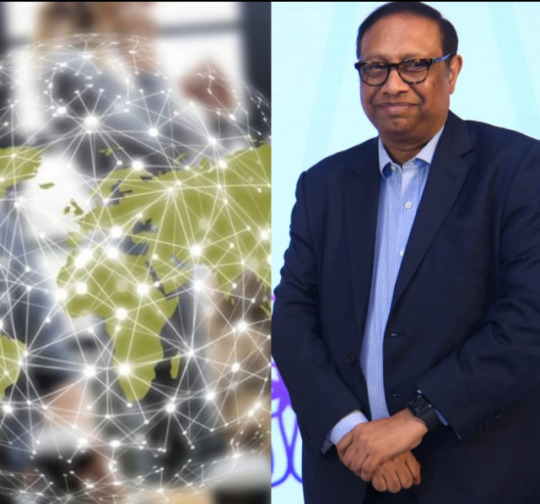
According to the Sethurathnam Ravi BSE ,the investment can be made in Indian Rupees and redemption is in Indian rupees. Investing in overseas Mutual Fund which is non-domestic has its own challenges in terms of methodology of payment, foreign exchange fluctuation and taxation, he explains. “The most preferred investment vehicle is through domestic fund houses as data and performance is readily available. Investors who have strong domestic presence the most efficient mechanism is to invest through domestic fund houses who in turn invest through various schemes in foreign stocks”, S Ravi said.
Sethurathnam Ravi also explains about the pattern of investment in overseas mutual funds. As per his affirmation the pattern of investment in international mutual fund is different from that of investments in domestic mutual funds. There are many things that need to be taken care of while investing in international mutual funds. S Ravi also explains about the term of investments that are suitable for investing in overseas mutual funds unlike domestic funds.
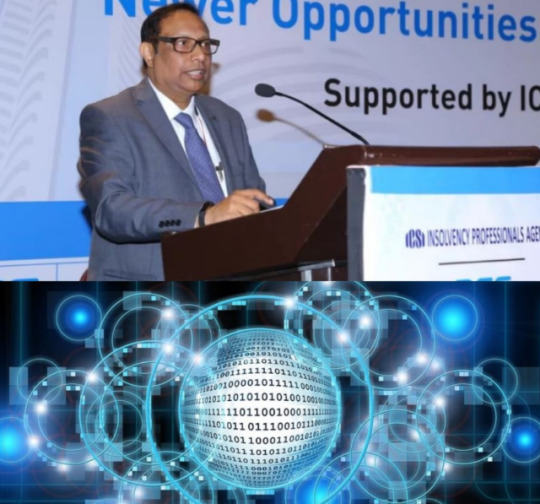
“An aspect which needs to be factored in this is that it is always better to invest medium or long-term perspective as one foreign stock give a good return over a period of time. Short-term investment in international mutual funds have witnessed volatility and thus should be avoided. Non-resident Indians have the liberty of investment from the country of residency. International mutual funds have delivered return of 27% in the last year. The three-year return is around 12% and the five-year return is approximately 13%”, Mr. Ravi, Former BSE Chairman affirms.
Investors still have the option to choose country specific investment through domestic fund house. There are specific schemes for investments predominantly in the US based stocks. Today the investor is equipped with data wherein fund performance is available along with NAV and returns, Sethurathnam Ravi concluded.
Also Watch:
youtube
#SethurathnamRavi#SethurathnamRaviBSE#SRaviBSE#SRavi#SRaviBSEFmrChairman#SRaviBSEChairman#SethurathnamRaviFmrBSEChairman#Youtube
1 note
·
View note
Text
S Ravi, Former BSE Chairman Advices The Stock Market Investors“New Investors Should Be Patient During Tough Times”
At a time when the Covid-19 pandemic and consequent lockdowns affected the economy, the stock market was one of the very few areas where the wheels were still turning. This attracted many new investors, and a record number of new Demat accounts were opened. During then pandemic, the Indian stock market witnessed lakhs of new investors form the Tier-2 and Tier-3 cities. However, this enthusiasm seems to have waned as returns from the market have flattened in recent months. From a high of 20 lakh new investors in October 2021, it has dropped to 13 lakhs in April 2022.
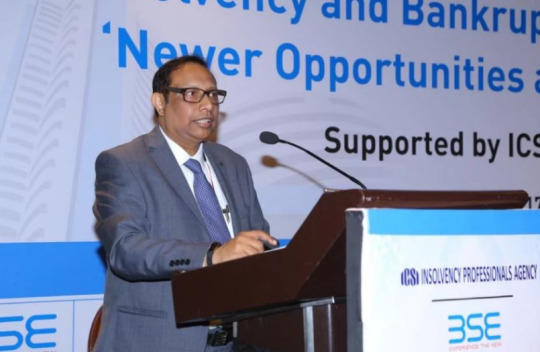
According to the former BSE Chairman Sethurathnam Ravi, foreign portfolio investments or FPIs became net sellers for eight out of 12 months in 2021–22 with a net outflow of Rs. 1.3 lakh crore, against a net inflow of Rs. 2.8 lakh crore in the previous year. Mutual funds, on the other hand, made heavy investments worth Rs. 1.7 lakh crore in the Indian equity market in 2021–22, according to the Reserve Bank of India.
There was a massive rise in the number of new Demat accounts. A total of 50 lakh Demat accounts were opened in 2019–20 and 1.42 crore in 2020–21. This shot up to 3.46 crore new Demat accounts in the year 2021–22. This means that on average, 28.8 lakh Demat accounts were opened every month during 2021–22, which was higher than 11.8 lakh accounts per month in the previous year and 4.2 lakh Demat accounts per month in 2019–20.
Due to this, the Indian stock market future remained dark with the pandemic looming over us. The global supply chain was crippled. Yet, S Ravi acknowledges that India’s stock market was one of the few areas that remained more stable than other markets. Finance Minister Nirmala Sitharaman said that retail investors seemed to act as shock absorbers even when foreign portfolio investors went away.
Experts including S Ravi BSE Chairman suggests that ups and downs in the stock market are a usual phenomenon and that new investors should be patient during tough times. For many new investors, the market trend during the 2008 American subprime mortgage crisis is too old to be considered. He said to India Today the other day that, “If the retail investors have used prudence and have invested in good stocks with strong fundamentals, they should not worry”. As a word of caution, Ravi added that retail investors should diversify their portfolios and should not take loans to invest in equity.
#SethurathnamRavi#SethurathnamRaviBSE#SRaviBSE#SRavi#SRaviBSEFmrChairman#SRaviBSEChairman#SethurathnamRaviFmrBSEChairman
0 notes
Text
Sethurathnam Ravi, Former BSE Chairman Advices Retail Investors To Diversify Their Portfolios
At a time when the Covid-19 pandemic and consequent lockdowns affected the economy, the stock market was one of the very few areas where the wheels were still turning. This attracted many new investors, and a record number of new Demat accounts were opened. During then pandemic, the Indian stock market witnessed lakhs of new investors form the Tier-2 and Tier-3 cities. However, this enthusiasm seems to have waned as returns from the market have flattened in recent months. From a high of 20 lakh new investors in October 2021, it has dropped to 13 lakhs in April 2022.
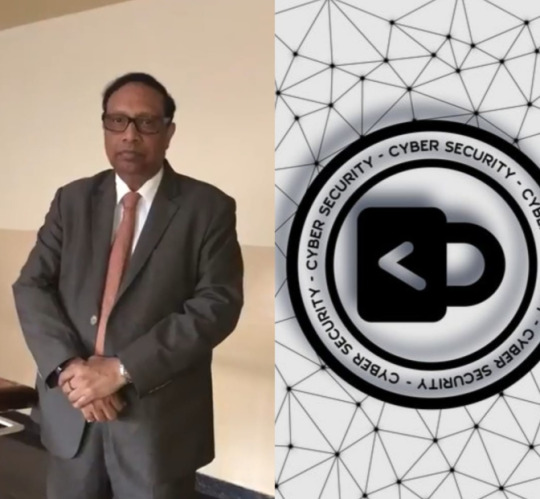
According to the former BSE Chairman Sethurathnam Ravi, foreign portfolio investments or FPIs became net sellers for eight out of 12 months in 2021–22 with a net outflow of Rs. 1.3 lakh crore, against a net inflow of Rs. 2.8 lakh crore in the previous year. Mutual funds, on the other hand, made heavy investments worth Rs. 1.7 lakh crore in the Indian equity market in 2021–22, according to the Reserve Bank of India.
There was a massive rise in the number of new Demat accounts. A total of 50 lakh Demat accounts were opened in 2019–20 and 1.42 crore in 2020–21. This shot up to 3.46 crore new Demat accounts in the year 2021–22. This means that on average, 28.8 lakh Demat accounts were opened every month during 2021–22, which was higher than 11.8 lakh accounts per month in the previous year and 4.2 lakh Demat accounts per month in 2019–20.
Due to this, the Indian stock market future remained dark with the pandemic looming over us. The global supply chain was crippled. Yet, S Ravi acknowledges that India’s stock market was one of the few areas that remained more stable than other markets. Finance Minister Nirmala Sitharaman said that retail investors seemed to act as shock absorbers even when foreign portfolio investors went away.
Experts including S Ravi BSE Chairman suggests that ups and downs in the stock market are a usual phenomenon and that new investors should be patient during tough times. For many new investors, the market trend during the 2008 American subprime mortgage crisis is too old to be considered. He said to India Today the other day that, “If the retail investors have used prudence and have invested in good stocks with strong fundamentals, they should not worry”. As a word of caution, Ravi added that retail investors should diversify their portfolios and should not take loans to invest in equity.
#SethurathnamRavi#SethurathnamRaviBSE#SRaviBSE#SRavi#SRaviBSEFmrChairman#SRaviBSEChairman#SethurathnamRaviFmrBSEChairman
0 notes
Text
S Ravi, Former BSE Chairman Shares His Views on Retail Investors Losing Interest In Stock Markets
The Indian stock market witnessed lakhs of new investors from Tier-2 and Tier-3 cities during the pandemic. However, this enthusiasm seems to have waned as returns from the market have flattened in recent months. From a high of 20 lakh new investors in October 2021, it has dropped to 13 lakhs in April 2022. At a time when the Covid-19 pandemic and consequent lockdowns affected the economy, the stock market was one of the very few areas where the wheels were still turning. This attracted many new investors, and a record number of new Demat accounts were opened.
The future remained dark with the pandemic looming over us. The global supply chain was crippled. Yet, India’s stock market remained more stable than other markets. Finance Minister Nirmala Sitharaman said that retail investors seemed to act as shock absorbers even when foreign portfolio investors went away.
Sethurathnam Ravi, former BSE Chairman acknowledges that, foreign portfolio investments or FPIs became net sellers for eight out of 12 months in 2021-22 with a net outflow of Rs. 1.3 lakh crore, against a net inflow of Rs. 2.8 lakh crore in the previous year. Mutual funds, on the other hand, made heavy investments worth Rs. 1.7 lakh crore in the Indian equity market in 2021-22, according to the Reserve Bank of India.

There was a massive rise in the number of new Demat accounts. A total of 50 lakh Demat accounts were opened in 2019-20 and 1.42 crore in 2020-21. This shot up to 3.46 crore new Demat accounts in the year 2021-22. This means that on average, 28.8 lakh Demat accounts were opened every month during 2021-22, which was higher than 11.8 lakh accounts per month in the previous year and 4.2 lakh Demat accounts per month in 2019-20.
Experts including S Ravi BSE, former BSE Chairman suggests that ups and downs in the stock market are a usual phenomenon and that new investors should be patient during tough times. For many new investors, the market trend during the 2008 American subprime mortgage crisis is too old to be considered. “If the retail investors have used prudence and have invested in good stocks with strong fundamentals, they should not worry,” Sethurathnam Ravi, former Chairman BSE, told India Today. As a word of caution, Ravi added that retail investors should diversify their portfolios and should not take loans to invest in equity.
0 notes
Text
S Ravi On The Increasing Cyber Frauds In India – ‘Never Trust Strangers’ Should Be The Watchword For Customers
Sethurathnam Ravi BSE Former Chairman, asks customers to remember mantra “Never Trust A Stranger” to avoid getting defrauded. According to the expert, the fraudsters succeed on account of customer’s need for rewards or better returns, increased spending limits, saving while spending and most importantly, carelessness.
As S Ravi says, “The advancement of technology, increased usage of digital platforms and mobile becoming a one stop device for various financial transactions, has eased the way of receiving and paying money and saving time in paying bills, making investments and also getting reward points. However, like each coin has two sides, this advantage comes with disadvantage of certain cyber threats, phishing, accounts getting hacked, bogus loan/ discount/ cash back offers”.

Apart from these there are various scams that are run by fraudsters such as credit limit updation, multi-level marketing, work from home, online shopping, social welfare schemes, financial help messages on social media/ through emails, use of data filled in various personal forms filled, google forms circulated, e-mails or text messages appearing to be from a legitimate site but are actually part of a scam looking to gain access to one’s accounts or personal information and kyc details shared with third party getting mis-utilized etc to name a few.
S Ravi BSE former chairman also shared details on the booklet that last year RBI had published named Raju and 40 thieves which details out the various modus operandi of fraud that are being used to deceive the customers as well as the checks one should make before making transactions. He also mentioned about the web series, ‘Jamtara’ that told the story of how youngsters wanting to make easy money are running successful phishing rackets by duping the vulnerable citizens.
Sethurathnam Ravi also mentioned that the customers are cheated through telephone calls asking for OTPs for transactions, sim cloning wherein the fraudster poses as the representative of Telecom Company and sells the idea of sim card upgrades which require Aadhaar details and unique SIM card number to be shared, transactions through payment links shared by unauthorized persons, easy loans on payment of advance fees, ATM frauds using skimming devices in the ATM unit, etc.
“Apart from being aware, one could protect themselves by updating their devices frequently to deal with new security threats, using multi-factor authentications of using security questions along with passcode/ PIN and having data backup as well as install software for protecting internet connection. One should always shop from secured websites and secured Wi-Fi networks. Last but not the least, don’t be embarrassed of getting cheated and report the matter to bank/financial institution/company, file a complaint on the Cyber Crime website at https://cybercrime.gov.in/ or call up their 24x7 Helpline 1930”, the former BSE Chairman S Ravi explained.
The fraudsters succeed increasingly nowadays as we seem to have forgotten what our elders taught us that Never Trust Strangers and Greed causes great Disaster, S Ravi says advising people to follow these mantras and always be alert of the frauds.
0 notes
Text
Mastering Your Financial Destiny: S Ravi's Guide to Understanding and Building a Strong Credit Score
Your credit score serves as a financial passport, either opening doors to a world of opportunities or potentially constraining your financial journey. S Ravi BSE, former Chairman, shares insights on comprehending and building a robust credit score through disciplined financial habits and strategic planning.
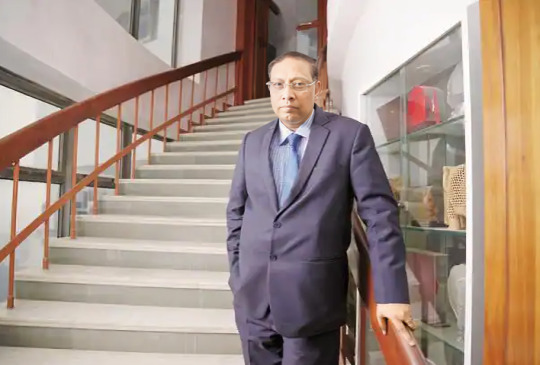
According to Sethurathnam Ravi, key components influencing your credit score trajectory include factors like payment history. Timely payments on credit cards, loans, and other financial commitments can significantly enhance your credit score. Maintaining older accounts and having a diverse mix of credit accounts can also positively impact your creditworthiness, provided these accounts are managed responsibly.
Building a good credit score requires a proactive approach and effective financial planning. S Ravi advises starting with setting a budget and living within your means. To avoid missed due dates, ensure timely bill payments and set up automatic reminders, preventing credit responsibilities from becoming overwhelming.
A high credit score, as emphasized by S Ravi, unlocks doors to improved financial options, including lower loan interest rates, favorable credit card terms, and increased credit limits. It also enhances bargaining power when dealing with lenders, potentially leading to better rates on loans and credit. Conversely, a poor credit score can result in loan denials or approvals with higher interest rates, limiting borrowing options and increasing overall expenses.
Therefore, S Ravi BSE, underscores the importance of understanding the factors influencing your credit score and how financial decisions impact your creditworthiness. He recommends staying informed by regularly checking credit reports. Your credit score is a powerful financial tool that shapes your future, and a good credit score opens doors to relevant opportunities.
In conclusion, S Ravi emphasizes the gradual process of building a strong credit score, emphasizing discipline and financial responsibility. As a financial expert, he provides valuable guidance to individuals seeking to navigate the intricate landscape of credit and secure a prosperous financial future.
1 note
·
View note
Text
Understanding and Building a Strong Credit Score: Insights from Financial Expert S Ravi, Former BSE Chairman
In the realm of personal finance, a high credit score holds paramount importance, influencing various aspects of one's financial life. Sethurathnam Ravi, a renowned financial expert and former Chairman of the Bombay Stock Exchange (BSE), sheds light on the intricacies of comprehending and enhancing your credit score. This essential financial metric serves as a powerful tool that shapes your financial destiny, with a robust credit score unlocking a myriad of opportunities.

Building and maintaining a good credit score is an ongoing process that necessitates discipline and financial responsibility. S Ravi BSE, Former Chairman emphasizes the significance of recognizing that a credit score is more than just a numerical value; it acts as a financial passport, either expanding the realm of financial options or constraining your financial journey.
Whether you're venturing into a mortgage, securing a car loan, or applying for a credit card, your credit score plays a pivotal role in assessing your eligibility and determining the interest rates you'll encounter. According to S Ravi, factors such as your payment history significantly impact the trajectory of your credit score. Timely payments on credit cards, loans, and other financial commitments exhibit commendable financial behavior, positively affecting your creditworthiness.
S Ravi BSE, delves into the importance of credit history length, elucidating that longer credit histories provide lenders with more data to evaluate your creditworthiness. Keeping older accounts open contributes positively to this aspect of your credit score.
Building a robust credit score demands proactive efforts, requiring diligence and strategic financial planning. S Ravi advocates starting with the creation of a budget and living within one's means. Timely bill payments, facilitated by setting up automatic reminders, are crucial to avoid the pitfalls of missed due dates that can lead to credit burdens.
In his latest articles, S Ravi outlines the pros and cons of credit scores. A high credit score opens doors to superior financial opportunities, such as loans with lower interest rates, credit cards offering favorable terms, and higher credit limits. It also enhances your negotiating power when dealing with lenders. On the flip side, a low credit score may result in loan denials or approvals with higher interest rates, limiting your access to credit. Landlords may even consider credit scores when renting a home.
S Ravi stresses the importance of understanding the factors influencing your credit score and how financial decisions impact your creditworthiness. Regularly checking your credit reports keeps you informed about your credit status. Establishing an emergency fund is advisable to cover unforeseen expenses and mitigate the risk of missed bill payments. Seeking guidance from a financial counselor or credit repair professional can be beneficial if you encounter credit-related challenges. In conclusion, S Ravi underscores that building and maintaining a good credit score is an ongoing journey that demands discipline and financial accountability.
0 notes
Text
Sethurathnam Ravi, former BSE Chairman shares his views on the successful 5 years of GST
Sethurathnam Ravi (S Ravi) is the former BSE Chairman and founder of Ravi Rajan & Co. Presently, Mr. Ravi holds the position of Non-Executive Chairman of Tourism Finance Corp. of India Ltd. and Director & Managing Partner at RRCA & Associates. Sethurathnam Ravi shares his views about the journey of GST in India as it completes five years since introduction.
According to Mr. Ravi, when the GST was introduced 5 years ago there were a lot of misgivings about how the centre and state governments will work together regarding the tax collection and how the distribution will work. In Sethurathnam Ravi’s opinion, compounded with this issue was the platform issue. At the time of the introduction of the GST, there was also the interpretation and the awareness issue from the SSE and it had also created a lot of confusion in that, he says.
S Ravi also explains the other obstacles that were on the road of GST until its successful acceptance. He says that the way was not easy for GST to get accepted by the people, but surely it was progressive and has finally seen the outcome. In his own words, “There were also issues of input credit, whether it is to be set up against liabilities. Then there were clarifications on that also, and there where issues on various rates that where there. So, I think over this last 5 years, 47 meetings with the GST council had taken place and every meeting was progressive to address some of these issues”.

Sethurathnam Ravi also says that the Goods and Services Tax has been a major reform across India. It has changed the view of the people about taxes and even the superseding of many of the other small indirect taxes was itself a major reform. In this way people had to only pay one direct tax, other than paying many small different taxes. S Ravi also highlights the fact that, to streamline this, in the last few years we have seen, despite a strong covid outburst, a very strong recovery in terms of collection in the form of GST.
“I look at it that it has been a very progressive journey. It was full of challenges of acceptability. But now it has been accepted. And I think more important is how we address to the lower category of people, i.e., the MSME and the SME's who have to bring in more awareness and to make the cost of compliance lesser. And also, to see how the compensation sess is taken care in the future. These are few of the things that will come in the future. But it has been a good journey. And the rationalization is taken place at a very fast pace”, Sethurathnam Ravi concluded.
0 notes